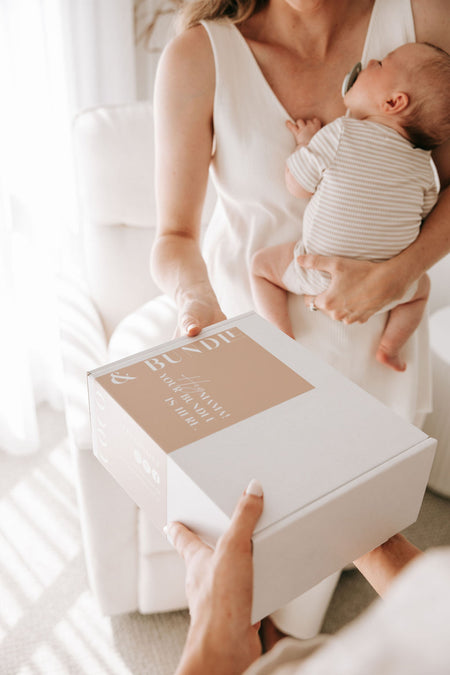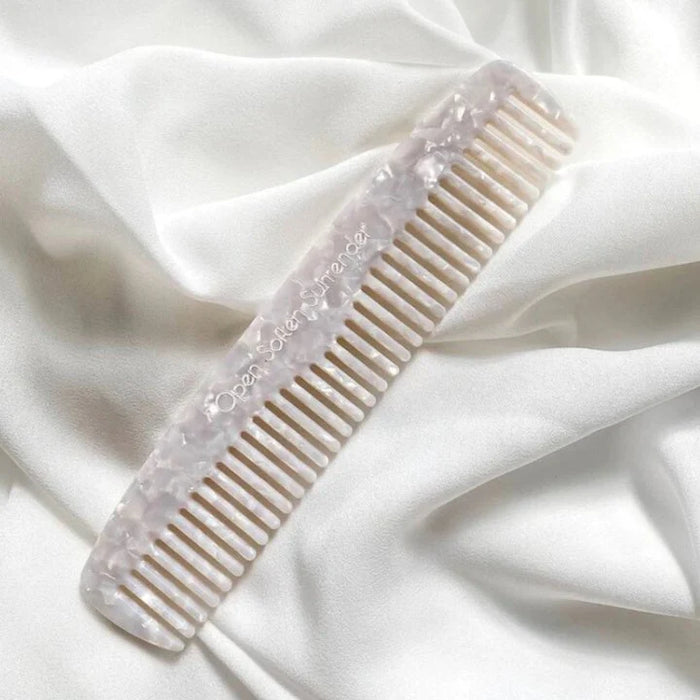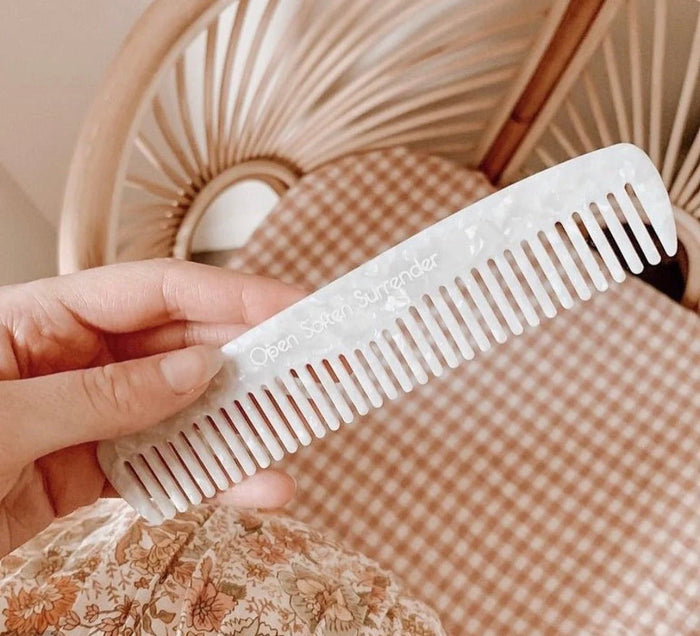Motherhood is a rollercoaster. It's joyous, magical, and one of the most fulfilling aspects of our lives – but it's also one of the hardest. Motherhood is not glamorous, and there are parts of many women's journeys that push them right to the limits.
Postpartum anxiety is one such challenge that thousands of mothers face, including Coco & Bundle founder, Zoe. In this candid interview, Zoe shares with us her deeply personal journey of overcoming postpartum anxiety while still navigating the residual complexities to this day.
From recognising the signs to seeking support and finding solutions, Zoe's story offers insight and inspiration to mothers navigating similar challenges.
Disclaimer: This article deals solely with postpartum anxiety and anxiety attacks. We are not discussing postpartum depression, which is an entirely different condition.
If you or someone you love might be dealing with postpartum anxiety or postpartum depression, you can call the PANDA Helpline on 1300 726 306 or find helpful resources at the end of this article.
What’s inside?
- What is postpartum anxiety?
- Recognising the first signs
- My experiences with bottle-feeding aversion
- My postpartum anxiety signs and symptoms
- What triggered my postpartum anxiety attacks
- Support and coping strategies that worked for me
- PANDA (Perinatal Anxiety & Depression Australia)
- How I prioritise self-care
- Why it’s crucial to raise awareness about postpartum mental health
- My favourite thing about being a mum
- Helpful resources
What is postpartum anxiety?
Postpartum anxiety is a type of anxiety disorder that some women experience after giving birth. It’s characterised by feelings of worry, fear, and nervousness that are persistent and interfere with daily life.
While it’s natural to have some level of anxiety after having a baby, postpartum anxiety involves excessive worry and fear that can be overwhelming and difficult to control.
Symptoms can include racing thoughts, difficulty sleeping, irritability, restlessness, and physical symptoms like headaches or stomach problems.
Postpartum anxiety can affect a woman’s ability to care for herself and her baby, so it's important to seek help from a healthcare provider if you're experiencing symptoms.
If you’ve been looking for postnatal anxiety recovery stories, you’re in the right place. Meet Zoe: little babe Mama, Coco & Bundle founder, and postpartum anxiety conqueror.

When did you first realise that what you were experiencing was postpartum anxiety?
You know, it wasn't until after my second child was born that I really started to connect the dots. I started having these intense panic attacks (which I now know were postpartum anxiety attacks). They were pretty hard to ignore. But looking back, there were signs long before that.
With my daughter, who was born in 2020, there was a lot of fear and worry, especially because of her health issues. But with my son, our 2022 baby, it was more like overwhelming and sudden panic attacks.
Sometimes, the anxiety attacks were triggered by the kids. Other times, there didn’t seem to be any trigger, I might be in the kitchen doing the dishes or having a shower, which made things really hard to navigate.
That’s when I realised, ‘Okay, this is something more than just the overwhelming feeling of being a mum.’
You mentioned your daughter’s health issues. Can you tell us about those?
As a newborn, my daughter, Harper, really struggled. Harper had a bottle-feeding aversion for months. Not being able to feed your baby, your newborn – it was impossible. She was so close to being classified as Failure to Thrive (FTT) and was being monitored very closely by health professionals.
My partner is also a FIFO worker, so I was basically on my own for a lot of that time. I didn’t have a support network and was really struggling navigating her health concerns by myself.
Medical professionals were answering my questions with roadblocks. I remember one specialist told me to simply ‘stop forcing the bottle on her [my daughter]’. It was infuriating, belittling and felt like it was implying fault on me as a mother.
So I took matters into my own hands. I think that primal motherly instinct kicked in, you know? I found a Facebook group for mothers and someone had recommended this book: Your Baby’s Bottle-feeding Aversion by Rowena Bennett.
It was like magic. Within hours, Harper showed improvement. She took in half a bottle – it doesn’t sound like much, and it’s not, but when your baby is starving and nothing else has worked, it was a miracle.
The bottle-feeding aversion was properly resolved when Harper was around 15 weeks old thanks to the book’s step-by-step process. Now that she was more settled, we started taking her out, in the pram, going on little walks and to the park.
And that’s when she started to get sick.
What were your postpartum anxiety signs and symptoms?
Harper’s sicknesses were never anything major, thank goodness, mainly bugs and viruses. She just picked things up so easily, especially when she started at daycare. That triggered my panic. My anxiety from her previous bottle-feeding aversion had manifested itself into a form of health anxiety. A simple snotty nose seemed like the end-of-the-world.
One of the biggest signs of that early postpartum anxiety was being hyper alert. I checked her temperature constantly, checked she was breathing constantly. And I don’t just mean a dozen times a day – I’m talking every few minutes, twenty-four seven.
Everything was about checking, over and over, all the time. I needed that confirmation that she was okay.
And then, after my son Finn was born, the panic attacks started.

What triggered your postpartum anxiety attacks?
For me, the attacks centred around leaving the house and driving. As the partner of a FIFO worker, it’s always me and both kids. There’s no such thing as quickly ducking down the road for milk or bread. They are coming with me rain, hail or shine.
In the early days, leaving the house was an ordeal. My kids hated the car. They would scream and kick and I’d worry sometimes they’d hurt themselves or pass out.
Soon, I felt the warning signs of a panic attack even when I was getting ready to leave. I’d dress my daughter for swimming lessons and feel agitated and overwhelmed just knowing that Finn was about to scream the whole 15 minute drive.
Eventually it go to the point that, my son and daughter weren’t newborn babies anymore. I began to wonder ‘How long does anxiety last after having a baby?’ It felt never-ending.
Thankfully, after finally getting professional help, my panic attacks stopped. I still deal with the overwhelm, but now I have the tools and knowledge to recognise those warning signs and deal with them before they get out of control.
Tell us about the support and coping mechanisms you found for your postpartum anxiety
I started seeing a therapist about a year ago and learned some fantastic breathing techniques. I do them every day. They’ve become a core part of my routine.
I do these breathing exercises while I’m putting the kids in the car, or any time I feel a hint of anxiety or irritation. Luckily, my son and daughter are so much better in the car now, too – that’s helped a lot!
My Therapist and I also utilised EMDR Therapy to combat the conditioning, as by this stage, I was even having panic attacks when I was driving solo. My body was recognising driving as a threat. Both of these tools have helped me immensely!
Aside from seeking professional help (which I can’t stress enough for those dealing with postpartum anxiety), I’ve found a local Facebook group for mums to be incredibly supportive. It provides a sense of community. Reading other people’s experiences, knowing that I’m not the only one dealing with this stuff, gives me comfort.
Now, having largely overcome my postpartum anxiety, I’m still an active group member. I’m the first one to comment advice for new mums and I like to link helpful resources whenever I can, especially to PANDA.
What role does PANDA play in combating postpartum mental health issues?
PANDA stands for Perinatal Anxiety & Depression Australia. This not-for-profit organisation is one of the country’s foremost leaders in supporting women and families with postpartum mental health struggles.
PANDA has a treasure trove of invaluable resources and online courses. They answer common questions like ‘Do I have postpartum anxiety?’ and ‘How do I talk to my doctor about perinatal anxiety?’
If you’re nervous about going to your GP, I highly recommend browsing the PANDA website first. Arm yourself with vital information and you’ll feel so much more prepared for the conversations ahead.
At Coco & Bundle, we’re also proud to donate 5% of profits each quarter to PANDA. We’re honoured to sponsor such an incredible organisation by contributing to their efforts in helping families navigate such challenging times.

How do you prioritise self-care now that you’ve overcome postpartum anxiety?
I neglected my self-care for so long. When you’re in the thick of postpartum anxiety, you don’t have the energy or mental capacity to do anything for yourself.
Now, I do a few different things for my self-care:
- Firstly, I set realistic expectations: The house isn’t always going to be clean and tidy, the kids are going to be late for daycare sometimes. Basically, I don’t need to be ‘perfect’. That takes a big mental load off.
- I now see a personal trainer once a week and do reformer Pilates to move my body and release endorphins.
- Maintaining a healthy lifestyle is also key. I’m not saying we need to be fitness fanatics, but ensuring you eat well and get some fresh air makes the world of difference.
- Finally, I utilise professional help. I see my therapist regularly and go to my GP as a first point of contact for any medical issues that crop up.
Having someone to talk to like a psychologist is a game changer – as well as comfort, I gained practical strategies for how to combat my anxiety attacks.
Why do you think it's crucial to raise awareness about postpartum anxiety?
So many of us suffer in silence. I know because this was me. I just thought I was overwhelmed, that this was all part of being a mum, but there were so many signs that indicated otherwise.
Had I known those signs, I would’ve sought the help I needed much sooner. I think raising awareness will shed light on postpartum anxiety and hopefully encourage women to speak up about it and get the help and support they deserve.
It can be daunting or embarrassing to ask your GP for a mental healthcare plan. Believe me, I know! But if everyone’s a bit more aware, and that taboo decreases, these kind of common mental health issues will be easier to navigate for everyone.
Further reading: PANDA’s guide to speaking with your doctor about mental health

Finally, what's your favourite thing about being a mum?
How can I choose just one!
I love the bond that’s developing between Harper and Finn. They’re becoming such close siblings, it’s wonderful.
I also love being there for their milestones. My husband misses a lot of the big things due to his work, so I really value witnessing their first words, first steps, and first days of daycare.
Even though the postpartum anxiety is still there in the background, and it’s something I still work on everyday, it gets easier with time. That’s what I want other mums to know.























0 comments